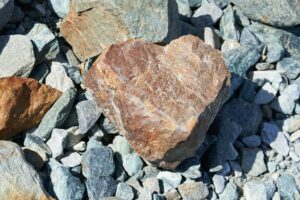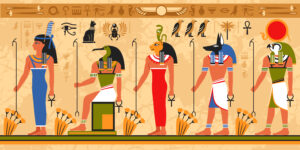Tisha B’Av means the 9th day of the Jewish month of Av, and on this day some 2000 years ago, the temple in Jerusalem was destroyed by the Romans. Remarkably, it happened on exactly the same date in the Jewish calendar as Solomon’s temple was destroyed by the Babylonians some 650 years before. The ground was levelled, sown with salt, and rendered desolate. The Jewish people no longer had access to the sacrificial system of atonement and encountering God that once was theirs. They were utterly banished from holy place where God had chosen to dwell and meet them, and from the city of Jerusalem itself. The holy menorah and articles of the temple were hauled off to Rome, and many Jews were slaughtered.
Tisha B’Av is a solemn time of mourning among the Jewish people to this day. But what is weird is that the first temple was also destroyed on the 9th day of Av, and many other tragedies happened to the Jewish people on the same date. Is there anything we can understand from this unhappy coincidence? And is there anything Christians can do to bring comfort?
Tisha B’Av in Jewish tradition
“On the ninth of Av it was decreed that our fathers should not enter the [promised] land, the temple was destroyed the first and second time, Beitar was captured and the city [Jerusalem] was ploughed up”. (The Talmud, Taanit 26b1)
This Jewish text was written in the second century, not long after the tragedy, and in it they connect the events of the two Jewish temples being destroyed, the failed revolt against the Romans, and the fearful refusal of the Israelites to enter the giant-filled land of Canaan. In another Jewish source, this is written about the reluctance to enter the Promised Land;
“And all the congregation lifted up their voice, and cried; and the people wept that night. Rabbah said in the name of R. Johanan: ‘That night was the ninth of Av. The Holy One, blessed be He, said to them: “You have wept without cause, therefore I will set [this day] aside for a weeping throughout the generations to come”’.” 2
Sometimes things are linked together in the Talmud because they are closely connected in concept, rather than actual historical accuracy, but it is interesting that the reluctance to enter the Promised Land was seen as the beginning of this cycle of sorrow. The Talmud explains the appropriate response:
“Rejoicings are curtailed. During the week in which the ninth of Av falls it is forbidden to cut the hair and to wash clothes but on the Thursday it is permissible in honour of the Sabbath. On the eve of the ninth of Av one may not partake of a meal of two courses nor eat meat nor drink wine. Rabban simeon b. Gamaliel said: one should make a difference in his diet.”
Today, many Jewish people will fast and mourn, express no joy even in greeting one another, and will sit on the floor to read Lamentations together in fitting memorial.
What does it mean for Christians?
According to the Bible, the reason the two temples were destroyed was because of God’s punishment. The first was at the hands of the Babylonians for Israel’s idolatry, indifference to the poor, and failing to trust God by letting the ground rest every seventh year, just as was promised in Jeremiah 26:28:
“Zion shall be ploughed as a field; Jerusalem shall become a heap of ruins, and the mountain of the house a wooded height.”
The second time was at the hands of the Romans, because we did not recognize or accept our Messiah:
“For the days will come upon you, when your enemies will set up a barricade round you and surround you and hem you in on every side and tear you down to the ground, you and your children within you. And they will not leave one stone upon another in you, because you did not know the time of your visitation.”” (Luke 19:43-44).
Jesus said that He would destroy the temple and raise it up in three days, because after that mighty weekend, all those who accept His forgiveness can be clean from sin and become His dwelling place. Today, he lives in us who believe.
Many Christians who enjoy a direct and personal relationship with God without need for the temple might struggle to empathise with the devastation felt by the Jewish people at this time. In the past, the church has been quite callous about the destruction of Jersualem, at times even rubbing salt in the wound as the Romans did. Relations between the Christians and the Jewish people quickly turned sour after the first century, and there was a lot of hostility in both directions. It is said that the reason the temples were destroyed by the lack of brotherly love, and groundless hatred. None of us are perfect in loving others, but lack of love can have catastrophic consequences.
Tragedies suffered by the Jewish people on Tisha B’Av in “Christian” countries:
- The First Crusade officially commenced on Av 9, 4856 according to the Jewish calendar (August 15, 1096 in our calendar), killing 10,000 Jews in its first month and destroying Jewish communities in France and the Rhineland.[1]
- Jews were expelled from England on Av 9, 5050 (July 25, 1290) [2]
- Jews were expelled from Spain on Av 8-9, 5252 (July 31, 1492). [3]
- On the eve of Tisha B’Av 5702 (July 23, 1942), the mass deportation began of Jews from the Warsaw Ghetto, en route to Treblinka.
However, in Romans 12:14-16 we read;
“Bless those who persecute you; bless and do not curse them. Rejoice with those who rejoice, weep with those who weep. Live in harmony with one another. Do not be haughty, but associate with the lowly. Never be wise in your own sight.”
The ‘first-born son’, Israel, has received hard discipline from our heavenly Father. The church, as the younger brother, sadly spent many centuries (especially during the Dark Ages) taunting Jewish people about the painful blow they received, and even adding to their suffering, instead of bringing comfort.
Yeshua famously wept as he experienced pain of death and loss around him as he stood beside the grave of Lazarus. He knew perfectly well that he was just about to raise Lazarus from the dead, and that Lazarus had a place in eternity anyway, but still – Jesus wept. One of the most remarkable verses in the Bible. Sometimes the most loving thing we can do is just be with someone in their pain, and comfort them with brotherly love.
Yearning for redemption
The Jewish identity is one full of deep yearning for redemption and restoration. Eagerly awaiting the time when God will come and put all things right. There is a readiness to acknowledge and sit in the pain of today, whilst longing for the promised hope of tomorrow. Do we feel this enough? We know that all of creation is groaning, but are we really full of longing and yearning for what’s coming?
“For I consider that the sufferings of this present time are not worth comparing with the glory that is to be revealed to us. For the creation waits with eager longing for the revealing of the sons of God. For the creation was subjected to futility, not willingly, but because of him who subjected it, in hope that the creation itself will be set free from its bondage to corruption and obtain the freedom of the glory of the children of God. For we know that the whole creation has been groaning together in the pains of childbirth until now. And not only the creation, but we ourselves, who have the firstfruits of the Spirit, groan inwardly as we wait eagerly for adoption as sons, the redemption of our bodies. For in this hope we were saved. Now hope that is seen is not hope. For who hopes for what he sees? But if we hope for what we do not see, we wait for it with patience.” (Romans 8:18-25)
Yes, there are current sufferings.
Yes, there is groaning.
But we have hope.
This is what we are all waiting for:
“Then I saw a new heaven and a new earth, for the first heaven and the first earth had passed away, and the sea was no more. And I saw the holy city, new Jerusalem, coming down out of heaven from God, prepared as a bride adorned for her husband. And I heard a loud voice from the throne saying, “Behold, the dwelling place of God is with man. He will dwell with them, and they will be his people, and God himself will be with them as their God. He will wipe away every tear from their eyes, and death shall be no more, neither shall there be mourning, nor crying, nor pain any more, for the former things have passed away.” And he who was seated on the throne said, “Behold, I am making all things new.” (Revelation 21:1-5)
[1] Soncino translation http://halakhah.com/pdf/moed/Taanith.pdf
[2] Eicah Rabba Petichta 33
















